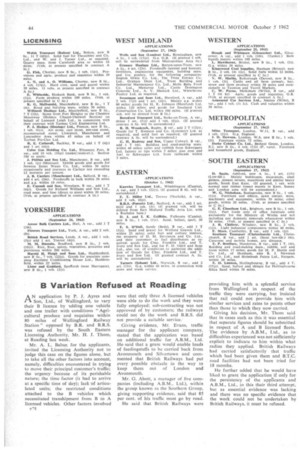B Variation Refused at Reading
Page 46

If you've noticed an error in this article please click here to report it so we can fix it.
AN application by P. J. Ayres and Son, Ltd., of Wallingford, to vary their B licence by Idding one vehicle and one trailer with conditions "Agricultural produce and requisites within 80 miles of Wallingford Railway Station" opposed by B.R. and B.R.S. was refused by the South Eastern Licensing Authority, Mr. H. J. Thom, at Reading last week.
Mr. A. L. Balne-, for the applicants, invited the Licensing Authority not to judge this case on the figures alone, but to take all the other factors into account, namely, difficulties encountered in trying to move their principal customer's traffic; the urgency because of its perishable nature; the time factor (it had to arrive at a specific time of day); lack of articulated units; the restricted conditions attached to the B vehicles which necessitated transhipment from B to A licensed vehicles. Other factors involved were that only three A licensed vehicles were able to do the work and they were fully employed; sub-contracting was not approved of by customers; the railways could not do the work and B.R.S. did not provide a suitable service.'
Giving evidence, Mr. Evans, traffic manager for the applicant company, stated that the application was based on additional traffic for A.B.M., Ltd. He said that a grant would enable loads of feed ingstuffs to be carried back from Avonmouth and Silvert own and commented that British Railways had put every possible obstacle in the way to keep them out of London and Avonmouth.
Mr. G. Abott, a manager of five companies (including A.B.M., Ltd.), within the group known as the Southern Group, giving supporting evidence, said that 85 per cent, of his traffic must go by road.
He said that British Railways were
providing him with a splendid service from Wallingford in respect of the traffic they were carrying, but insisted that rail could not provide him with similar services and rates to points other than those to which they now carried.
Giving his decision, Mr. Thom said that in cases such as this it was essential that separate figures should be submitted in respect of A and B licensed fleets. The evidence by A.B.M., Ltd., as to difficulties experienced was not sufficiently explicit to indicate to him within what radius they applied. British Railways had carried satisfactorily that traffic which had been given them and B.T.C. road facilities had not been tried for 18 months.
He further added that he would have liked to grant the application if only for the persistency of the applicants and A.B.M., Ltd., in this their third attempt, but as essential evidence was lacking and there was no specific evidence that the work could not be undertaken by British Railways, it must be refused.
























































































































